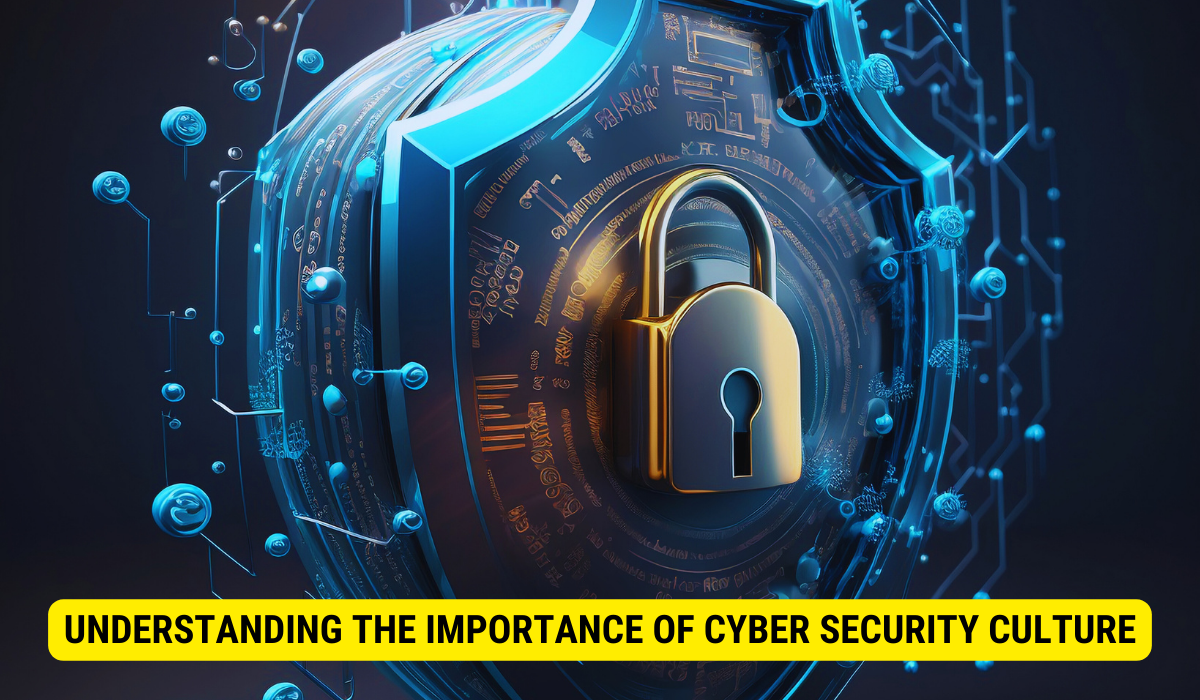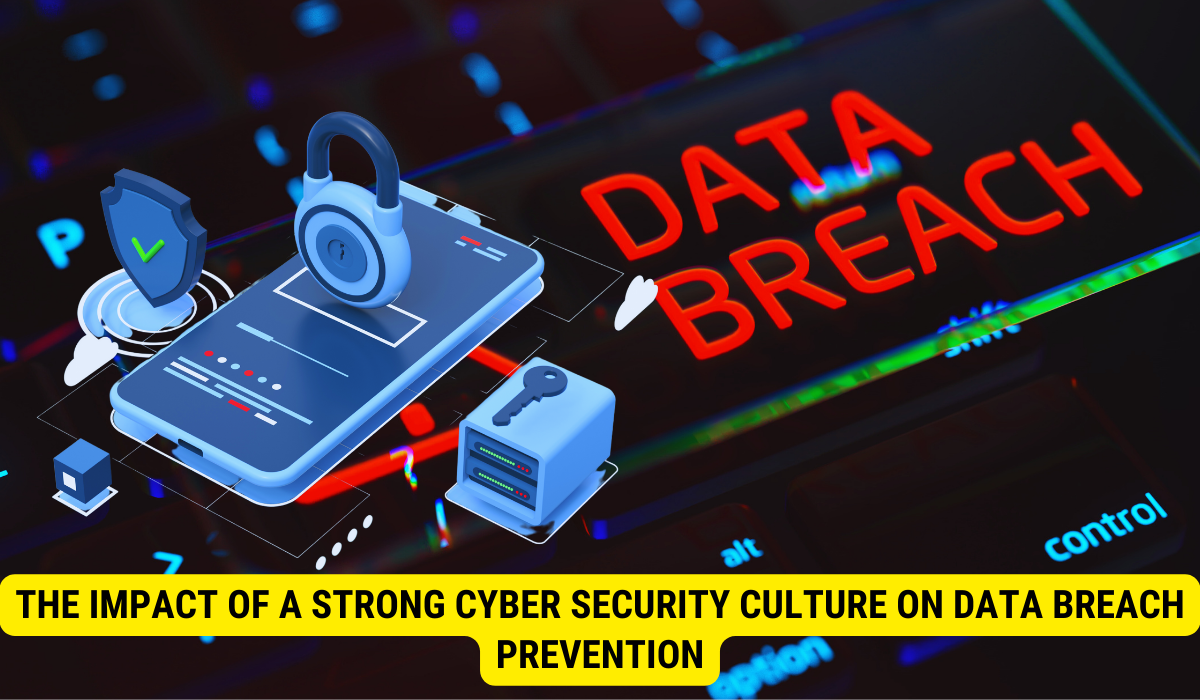To prevent data breaches, businesses must cultivate a strong cyber security culture. This involves fostering a security awareness mindset among all team members, establishing clear cyber security policies, investing in continuous training, regularly updating security protocols, and encouraging employee engagement in security processes.
In the contemporary digital era, data breaches are growing more frequent and represent a substantial peril to businesses and individuals. Developing a strong cyber security culture is essential in preventing these breaches and safeguarding sensitive information. By understanding the importance of cyber security culture and implementing key steps, businesses can minimize the risk of data breaches and protect their valuable assets.
Understanding the Importance of Cyber Security Culture

A solid cyber security culture lays the foundation for effective protection against potential threats. It involves fostering a mindset of security awareness and responsibility among all employees, from senior management to entry-level staff. This culture permeates every aspect of the organization, from how employees handle sensitive data to their awareness of potential cyber threats.
Ongoing education and training are pivotal in fostering a robust cybersecurity culture. Entities that emphasize cybersecurity greatly allocate resources to recurrent training initiatives, guaranteeing that their workforce possesses the necessary expertise and competencies to detect and counteract potential threats. These training initiatives encompass an extensive array of subjects, such as optimal approaches to handling password management, the ability to discern phishing endeavors, and the recognition of the significance of software updates.
Defining Cyber Security Culture
Cyber security culture refers to the collective behaviors, attitudes, and practices within an organization that prioritize the protection of digital assets. It involves creating a work environment that promotes security-conscious actions and encourages employees to safeguard the organization’s data and systems actively.
Establishing clear policies and procedures is one way to foster a strong cyber security culture. These guidelines outline the expected behaviors and actions related to cyber security and provide employees with a framework for making informed decisions. Regular communication and reinforcement of these policies help to embed a culture of security throughout the organization.
The Role of Cyber Security in Data Protection
A strong cyber security culture protects valuable data from unauthorized access, theft, or misuse. It ensures that employees understand the significance of data protection and actively contribute to maintaining a secure environment. This proactive approach significantly reduces the risk of data breaches. It minimizes the potential impact on the organization and its stakeholders.
In addition to education and policies, organizations with a strong cybersecurity culture also prioritize the implementation of robust technical controls. These controls include firewalls, intrusion detection systems, and encryption mechanisms that provide additional protection for sensitive data. Regular audits and assessments help identify vulnerabilities and ensure these controls effectively mitigate potential risks.
Furthermore, a strong cyber security culture extends beyond the boundaries of an organization. It involves collaboration and information sharing with external partners and stakeholders. Organizations can gain valuable insights into emerging threats and best practices by establishing strong relationships with vendors, customers, and industry peers, enhancing their cyber security posture.
In conclusion, a solid cyber security culture is essential for organizations to protect themselves against potential threats effectively. It involves continuous education and training, clear policies and procedures, robust technical controls, and collaboration with external partners. Organizations can significantly diminish the risk of data breaches and protect their valuable digital assets by prioritizing cyber security and fostering a culture of security awareness and responsibility.
Steps to Building a Robust Cyber Security Culture
Developing and nurturing a strong cyber security culture requires a comprehensive approach. By following these key steps, organizations can establish a resilient security culture that effectively prevents data breaches:
Identifying Potential Cyber Threats
Understanding the types of cyber threats that pose risks to your organization is essential in mitigating vulnerabilities. Conduct a thorough assessment to identify potential threats with the help of cyber security experts. This will enable you to develop targeted strategies that address specific risks relevant to your organization.
It is important to consider internal and external threats during the assessment process. Internal threats include disgruntled employees, accidental data leaks, or inadequate security measures. External threats, on the other hand, can come from hackers, cybercriminals, or state-sponsored attacks. By identifying and understanding these potential threats, you can better prepare your organization to protect against them.
Once potential threats are identified, it is crucial to analyze their potential impact on your organization. This analysis will help you prioritize your security efforts and allocate resources effectively. By understanding the potential consequences of a breach, you can develop a robust cybersecurity culture that focuses on the most critical areas.
Implementing Cyber Security Policies
Clear and comprehensive cyber security policies provide employees with guidelines on best practices and expectations regarding data protection. These policies should cover areas such as password management, use of personal devices, social engineering awareness, and incident reporting.
Engaging all stakeholders, including employees, management, and IT teams, is crucial when implementing cybersecurity policies. Involving everyone in this process helps guarantee a clear understanding and widespread policy compliance. It is also important to regularly assess and update these policies to remain adaptable to emerging threats and evolving regulations.
Furthermore, effective communication of the policy’s significance to all employees is essential. This can be achieved through various means, such as training sessions, internal communications, and awareness campaigns. By highlighting the importance of cybersecurity policies, employees will be more inclined to adhere to them actively, thereby contributing to establishing a robust security framework.
Training and Educating Employees
Investing in regular training and education programs is crucial to instilling a strong cybersecurity culture. Provide employees comprehensive training on various security topics, including identifying phishing attempts, securing mobile devices, and handling sensitive data.
Training sessions can be conducted in various formats, such as workshops, online courses, or interactive simulations. By providing hands-on experiences and real-life examples, employees will gain practical knowledge and skills to protect themselves and the organization from cyber threats.
In addition to initial training, promoting ongoing education and awareness is important. This can be achieved through newsletters, workshops, webinars, and other informative resources. Keeping employees updated with the evolving cyber threat landscape, they will be better equipped to identify and respond to new and emerging threats.
Furthermore, fostering a culture of continuous learning and improvement is essential. Encourage employees to share their experiences, report suspicious activities, and suggest improvements to existing security measures. You can tap into their collective knowledge by involving employees and creating a collaborative environment prioritizing cyber security.
Maintaining and Improving Cyber Security Culture
A strong cyber security culture is not a one-time effort but a continuous process. It requires regular maintenance and improvements to stay ahead of emerging threats:
Ensuring the safety and security of digital assets is of utmost importance in today’s interconnected world. With cyber threats becoming increasingly sophisticated, organizations must adopt a proactive approach to maintain and improve their cyber security culture. Let’s explore some key strategies:
Regularly Updating Security Protocols
As cyber threats evolve, staying vigilant and updating security protocols is crucial. Regularly assess the effectiveness of existing security measures and make necessary adjustments to address emerging risks. This includes updating software and firmware, implementing patches, and enhancing network security.
Moreover, organizations should establish a comprehensive vulnerability management program to identify and remediate potential weaknesses. Regular security audits and penetration testing can help identify vulnerabilities and ensure that security protocols are current.
Encouraging Employee Engagement
Engaged employees play a significant role in maintaining a strong cyber security culture. Encourage employees to actively participate by reporting potential security incidents, sharing best practices, and providing feedback on existing security measures. Recognize and reward employees consistently following security protocols, reinforcing a security awareness culture.
Organizations should allocate resources towards extensive training initiatives to instruct employees about cyber threats and preventive measures. By nurturing a feeling of ownership and accountability among their workforce, organizations can establish a united front against cyber attacks.
Evaluating and Adapting to New Threats
Cyber threats are ever-changing, necessitating the need to remain well-informed about emerging threats and trends. It is crucial to routinely analyze and appraise new threats and vulnerabilities that could potentially affect your organization. Additionally, fostering collaboration with experts in the industry and staying abreast of the most recent advancements in cybersecurity research will allow you to adjust and enhance your security measures accordingly.
Implementing a threat intelligence program can provide invaluable insights into emerging threats, empowering organizations to take proactive steps in risk mitigation. By capitalizing on the expertise of external partners and peers within the industry, organizations can maintain a competitive edge over cyber criminals.
In conclusion, maintaining and improving cyber security culture is an ongoing process that requires organizations to stay proactive, engage employees, and adapt to emerging threats. Organizations can strengthen their cyber defenses and safeguard their valuable digital assets by continuously updating security protocols, encouraging employee engagement, and evaluating new threats.
The Impact of a Strong Cyber Security Culture on Data Breach Prevention

A robust cyber security culture has far-reaching benefits and directly contributes to the prevention of data breaches:
How Cyber Security Culture Reduces Risk?

Promoting a security-aware culture is essential to ensure that staff members are well-informed about potential threats and possess the necessary expertise to minimize these risks. By nurturing an environment that places a high value on safeguarding data, companies can substantially diminish the chances of data breaches arising from human mistakes, carelessness, or deliberate misconduct.
The Long-Term Benefits of a Security-Conscious Culture
Developing a strong cyber security culture benefits organizations beyond data breach prevention. It enhances customer trust, strengthens brand reputation, and improves operational resilience. A culture that places a high value on security sends a positive message to clients, partners, and employees, reinforcing the organization’s commitment to protecting sensitive information.
Key Takeaways
- Foundational Role of Cyber Security Culture: A robust security culture is the primary defense mechanism against potential data breaches, emphasizing proactive measures and vigilance.
- Continuous Training: Regular education on potential threats and preventive measures is crucial for equipping employees with the skills to combat cyber threats.
- Clarity in Policies: Clear and comprehensive cyber security policies provide actionable guidelines on best practices and expectations concerning data protection.
- Employee Engagement: Engaged and informed employees are crucial in bolstering an organization’s defense against cyber attacks. This makes them an integral component of a security-centric culture.
- Adaptability: The digital threat landscape continuously evolves, requiring organizations to stay updated and modify their security protocols in response to emerging threats.
FAQs
What is meant by cyber security culture?
Cyber security culture refers to the collective behaviors, attitudes, and practices within an organization that prioritize the protection of digital assets.
How can organizations foster a strong cyber security culture?
Organizations can foster this culture by investing in regular training, establishing clear security policies, encouraging employee engagement, and maintaining updated security protocols.
Why is continuous education essential in a cybersecurity culture?
Continuous education ensures that employees stay informed about the evolving cyber threat landscape, enabling them to effectively identify and respond to new and emerging threats.
How does a robust cybersecurity culture benefit a business?
A robust security culture reduces the risk of data breaches, enhances customer trust, strengthens brand reputation, and ensures overall operational resilience.
What role do employees play in upholding cyber security culture?
Employees play a pivotal role by adhering to security protocols, reporting suspicious activities, sharing best practices, and actively participating in training sessions.
Conclusion
In conclusion, developing a strong cyber security culture is paramount in preventing data breaches. By understanding its importance, implementing key steps, and maintaining a proactive approach, organizations can reduce the risk of data breaches and safeguard their valuable assets. Investing in a comprehensive security culture will not only prevent data breaches but also foster a secure work environment, earning the trust of stakeholders and positioning the organization for long-term success.
